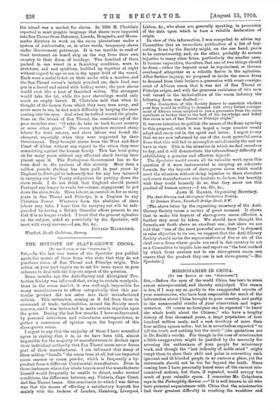THE BOYCOTT OF SLAVE-GROWN COCOA.
[TO THE EDITOR OF THE "SPECTATOR.")
Sift,—In the last two issues of the Spectator you publish again the names of those firma who state that they do not purchase cocoa of San Thome and Principe origin. This action on your part impels me to ask for some space in your columns to deal with the boycott aspect of the question.
Some months ago the Anti-Slavery and Aborigines' Pro- tection Society was informed that, owing to certain manipula- tions in the cocoa market, it was well-nigh impossible for many manufacturers to affirm categorically that this par- ticular product did not enter into their manufactured articles. This intimation, coming as it did from those in command of trade technicalities, caused the Society much concern, and I was instructed to make certain inquiries upon the point. During the last few months I have endeavoured, by personal interviews and voluminous correspondence, to gather a consensus of opinion upon the boycott of this slave-grown cocoa.
I regret to say that the majority of those I have consulted agree in stating that it is, as we have been told, almost impossible for the majority of manufacturers to declare upon their individual authority that San Thome cocoa never forms part of their manufactures. I am informed that many of them seldom " handle " the cocoa bean at all, but use imported cocoa essence or cocoa powder, which is frequently a by- product from a different Continental manufacture. Even in those instances where the whole bean is used the manufacturer himself would frequently be unable to detect, under normal conditions, the difference between, say, Victoria, Cape Coast, and San Thome beans. One conclusion to which I was driven was that the means of effecting a satisfactory boycott lies mainly with the brokers of London, Hamburg, Liverpool, Lisbon, &c., who alone are, generally speaking, in possession of the data upon which to base a reliable declaration of origin. In view of this information, I was compelled to advise my Committee that an immediate publication of a list of boy- cotting firms by the Society might, on the one hand, prove
to be untrustworthy, and, on the other, probably do serious
injustice to many other firms, particularly the smaller ones. It became imperative, therefore, that one of two things should be done,—either the boycott must be regularised, or thrown overboard altogether as a reliable factor in the agitation. After further inquiry, we proposed to invite the cocoa firms to demand from their brokers a guarantee with every consign- ment of African cocoa that it was not of San Thome or Principe origin, and with the generous assistance of two men well versed in the technicalities of the cocoa industry the following form was drafted :—
"The Committee of this Society desires to ascertain whether your firm would be willing to demand with every future consign- ment of African cocoa supplied to you a guarantee from the cocoa merchant or broker that to the best of his knowledge and belief this cocoa is not of San Thongs or Principe origin."
It was our intention to publish the names of the firms agreeing to this proposal, which it was hoped a large number would adopt and carry out in the spirit and letter. I regret to say that we are now informed by one of the most powerful cocoa firms that this will fail to accomplish satisfactorily the end we
have in view. This is the situation in which we find ourselves to-day, and it will demonstrate the extraordinary difficulty of establishing a genuine and effective boycott.
The Spectator would crown all its valuable work upon this question if it were instrumental in securing an adequate formula for the boycott of slave-grown cocoa which would meet the situation without doing injustice to those chocolate
and cocoa manufacturers who hesitate to declare, bat heartily wish they could honestly do so, that they never use this product of human misery.—I am, Sir, &se.,
JOHN H. HARRIS, Organising Secretary. The Anti-Slavery and Aborigines' Protection Society, 51 Denison House, Vauxhall Bridge Road. S.W.
LThe above letter by the organising seceetary of the Anti- Slavery Society raises a matter of great moment. It shows that to make the boycott of slave-grown cocoa effective a further step must be taken. We should have thought the formula set forth above an excellent one; but since we are told that "one of the most powerful cocoa firms" is disposed to raise objection to its use, we suggest that the Anti-Slavery Society should invite the representatives of five or six of the chief cocoa firms whose goods are used in this country to act as a Committee to inquire into and report on" the best method by which firms anxious not to use slave-grown cocoa can ensure that the product they use is not slave-grown."—En. Spectator.]






































 Previous page
Previous page